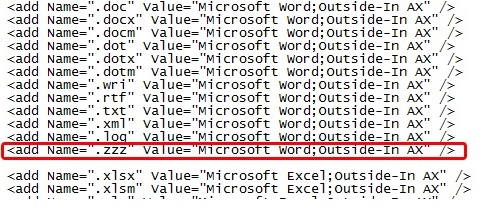Adding a File Extension To Document Conversion Service
PEERNET Document Conversion Service is an off the shelf high volume solution for converting documents to high quality TIFF, JPEG, Adobe PDF, and other image formats. The Peernet Document Conversion Service Product is a very flexible, easy to navigate and robust solution to your file converter needs — and Peernet offers a comprehensive support service for all products. Below is just one query our technical team recently encountered from one of our users.
Question: I have a file extension (ie .ZZZ) that Word is able to open and print, but it is not in the default list of file extensions that Document Conversion Service converts. How do I add a file extension so I can convert this file extension in Document Conversion Service?
Answer: You can add the file extension to the File Extension Mapping XML file or to the extension list in the Watch Folder configuration file.
Configure: If you are running the Watch Folder service, you can do the following:
- Stop the Watch Folder service.
- Edit C:\Program Files (x86)\PEERNET Document Conversion Service 2.0\Samples\C#\PNDocConvWatchFolderService\bin\Release\PNDocConvWatchFolderService.exe.config.
- Scroll down to the file extensions for Word.
- Add the line: <add Name=”.zzz” Value=”Microsoft Word;Outside-In AX” />

- Save the file.
- Re-start the Watch Folder service.
- The new file extension will now be converted by Document Conversion Service when you drop those files in the Watch Folder Input folder.
If you using the Command Line or .NET utilities, in which you are specifying a profile, you can do the following:
- Edit C:\ProgramData\PEERNET\Document Conversion Service\Profiles\File Extension To Converter Map.xml.
- Scroll down to the file extensions for Word.
- Add the line: <add Name=”.zzz” Value=”Microsoft Word;Outside-In AX” />

- Save the file.
- The new file extension will now be converted by Document Conversion Service when you call the command line or the .NET utilities in your code.


